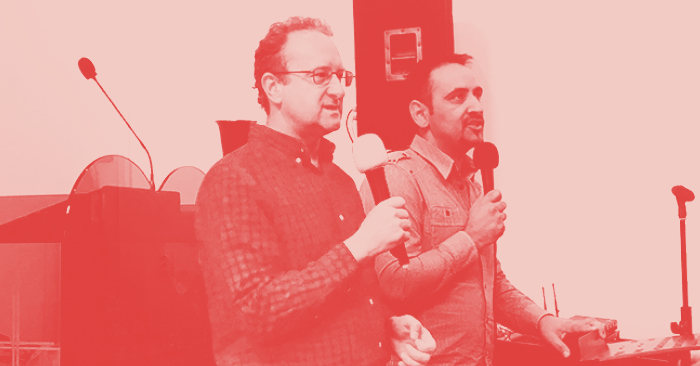Partners In Ministry with the Roma

Meeting the Roma
“I laughed more tonight than during our first two years here in the Czech Republic,” I said to my wife as we left Ivan and Jana’s house in 1999. We did not know it at the time but we had just met our best friends and greatest colleagues in our mission field. It was also our first introduction to the friendliness and warmth of the Roma people. Within days, we were planning together for youth events and an adult Bible study. The Roma in the city trusted me because they trusted Ivan and Jana. I would soon learn the particular importance of building trust as a basis for partnership when working as a gadje (non-Roma) with Roma. From those humble beginnings, a church was planted and Ivan and Jana became the leaders. Back then I could not have dreamed of the ministry path on which God would lead me. Since those early days, I have laughed, cried, and struggled with many Roma Christian leaders. It has been a joy to progress from evangelism and youth work, to church planting with a Roma couple, to coaching other Roma church planters, to traveling and teaching in Eastern Europe, to my present day job of developing partnering relationships between Roma and non-Roma churches, denominations, and organizations in Europe and the USA.
Even as an introvert, networking and developing partnering relationships comes naturally for me. I have a strong belief that unity in the Body creates energy and opportunities that we cannot achieve when working alone. Too many ministries, either by choice or circumstance, are isolated and do not have enough people to do fruitful ministry. Roma Christians often have the added challenge of being marginalized. At best, churches do not see the necessity of reaching the Roma. At worst, they do not want Roma in their churches and oppose ministry to them. However, God is a global God who brings his people together to show a watching world what unity in Christ looks like.
Mission Partnering
In 2014 I attended the “Roma for the Nations” conference as a representative for ReachGlobal, a mission organization committed to developing, empowering, and releasing national workers. Out of this conference, Roma Networks was established with the vision “to network, connect, and research for the sake of sharing the gospel and seeing transformation in Roma communities throughout Europe.” They do this through regional networks that come together to educate, empower, and encourage Roma and non-Roma leaders. During lunch one day at a 2015 conference, Jim Baker and I sat with the Roma Networks board and brainstormed possibilities of cooperation. I have been told, usually with a smile, that I have the gift of “finding work for others.” The leaders of Roma Networks have the same gift and after an hour and a half together, we each had long to-do lists that would take months to complete! This was the beginning of a rich partnership that would lead to lasting cooperation between our missionaries and the ministries represented by Roma Networks. Some of our work together included training in member care, training in the use of media tools, creating a documentary of God’s work among the Roma in Europe, coaching, and consulting.
One of the greatest felt needs of the Roma church in Europe is pastor training. The gospel is spreading quickly and the churches are struggling to make disciples. There are socio-economic factors that limit the number of full-time paid pastors. With this in mind, 11 ReachGlobal missionaries from two teams recently travelled in Hungary, Serbia, and Romania. The missionaries from the Catalyst Team work with nationals to launch gospel initiatives among marginalized people. The Global Equipping Team trains Christian leaders in emerging gospel movements. After collectively connecting with hundreds of Roma leaders and getting to know Roma culture and church life, we met with Roma Networks leaders for two days of planning. The outcome was a plan for pastor/leader training in the areas of Bible study (Pathways Bible Studies) and church planting. There is ongoing discussion about training in community development, story-centric Bible teaching and leadership development.

This partnership between the Catalyst Team, Global Equipping Team, and leaders of Roma ministries is built on trust and cooperative work. However, it is just the beginning. I recently had the privilege of serving as the U.S. representative at the Roma Networks country representative meetings in March 2017. It was gratifying to see people who I knew when they were just starting as pastors/church planters now traveling internationally as country representatives! Secondly, it was exciting to hear country reports from representatives of 27 countries. There were reports about a wide variety of ministries in diverse situations. For example, in Finland there are no “Roma churches” because they are all integrated. In the Czech Republic, however, the struggle for acceptance is hard and often discouraging.
Local Church Partnership
My presentation focused on building relationships between individual ministries in Europe and ReachGlobal missionaries and U.S. local churches. There is great synergy when these three partners can work together. One U.S. local church is considering sponsoring training in Community Health Evangelism (CHE) through the ReachGlobal Global Equipping team. The goal would be to train the church’s people and other missionaries in CHE. Then the local church in conjunction with experienced missionaries could equip Roma leaders in Europe to plant churches in a way that does not create dependency. This model of a local church working with a training missionary and a Roma ministry is ready to be multiplied with church planting, community development, Bible training, story-centric Bible teaching, and leadership development.
Things About Partnership that I Have Learned from the Roma
1. Trust is the basis of all partnerships. Building a partnership is building a relationship, and this requires trust forming over time. Although both people and the task are important, trust can only be built if the focus is on the people—and this contributes to better long-term results. Although building trust is an important factor that should be emphasized in any partnership relationship, it is especially important in a Roma context because of Roma history and their current situation.
2. Slow and steady wins the race. (See #1 above about taking time). Western missionaries (myself included) and church leaders tend to be very task oriented. They see what needs to be done and want to get to it. (I once had a missions pastor tell me I might not be the right person for this job because I didn’t have a winner-take-all-attitude. He said I should talk about Europe as the new ‘dark continent’ where we are going to launch an invasion to “invade and conquer” as soldiers of Christ! In my mind, our discussion ended at that moment.) But Roma culture, especially in Eastern Europe, is intensely relationship oriented and time efficiency is not as important as in Western culture.
3. Network broadly/partner deeply. Not everyone you meet will be the right fit for a partnership. It is important to know what God is doing among many areas of ministry so that you can understand Roma culture, European culture, and local culture. It is important to spend time getting to know people so you really know how they are wired and how they do ministry. This takes time (see #1 and #2 above about taking time). So get to know a lot of Roma ministries and leaders. Find out where there can be a win-win situation where both sides will benefit with each other’s strengths.
4. Partnership is a two way street. Partnership means that you are both equal partners. You may have different strengths but you should go into any partnership looking for those strengths that can work together. Push all thoughts out of your head that you are going to “help a poor, underdeveloped people.” The Roma people are marginalized, and in many cases, oppressed. But they are not weak and do not “need our help.” The Roma church is vibrant and has a lot to offer. Western churches need to look at the wealth of relationship, the faithfulness of Roma churches, and see how God is working among them. That is a story that God is writing to show the world something special about his character. Take the time to look for the strengths of both sides in this equal partnership (See #1,2,3 above about taking time).
Developing friendships and partnering with Roma churches has not always been easy but has always been rewarding and life-giving. I suggest you give it a try.









comments